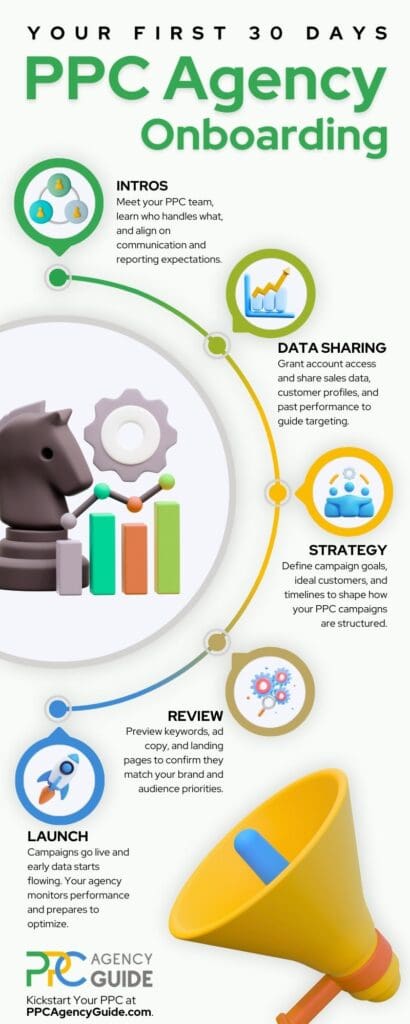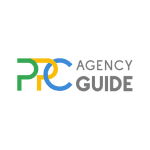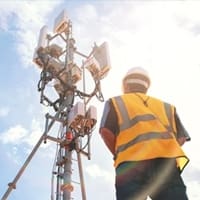
Signing with a pay-per-click (PPC) agency is a big step. You’ve no doubt invested considerable time deciding if paid advertising is right for your business, vetted agencies, evaluated proposals, and negotiated your PPC contract. You’ve done your part, and you’re ready for your results to take off. But, let’s be real. The first 30 days with a PPC agency can seem a little anticlimactic. While you might see some results, this early phase is more about setting your team up for success than anything else. Give us a few minutes, and we’ll walk you through the initial PPC setup steps and what to expect during your first month with a PPC agency.
PPC Agency Onboarding
If you’re working with an experienced agency, expect the first week or two to be dedicated to the PPC onboarding process. This phase is all about laying the groundwork for success by aligning the people and processes.
Introductions to Your PPC Team
One of the first steps of a typical PPC agency onboarding process is getting to know the team. The agency should explain how they work together, who you can contact for what, and how updates or reports will be shared.
- Agency Point of Contact: You’ll usually meet your dedicated account manager or strategist. This is the person who will handle your day-to-day communication and guide the relationship.
- Supporting Specialists: You might also be introduced to ad platform specialists, data analysts, or designers if your campaign involves creative assets.
Account Access and Permissions
If you already have an existing Google Ads or Microsoft Ads account, the agency will request access. Ensure they’re given manager-level access rather than ownership of the account. You’ll need to retain ownership to ensure you always have access to your campaigns even if you end the relationship with your PPC agency.

This setup also provides you with complete transparency into your accounts, which is essential when you’re measuring agency performance later. Common access requests during this stage of the initial PPC setup process include:
- Native Platforms: Expect requests for account access to any ad platform you’re planning to run campaigns on and potentially platforms you’ve previously run ads on so that they can assess prior results and learn from them.
- Google Analytics and Tag Manager: Tools like Google Analytics and Google Tag Manager (GTM) will allow the team to track conversions, behavior, and campaign impact.
- CRM or Lead Management Tools: If you use software like HubSpot or Salesforce, limited access may be requested to help connect ad data with lead outcomes.
- Website or CMS: At a minimum, the team will need to verify that tracking pixels are working and that your landing pages are ready to handle paid traffic.
If you’re starting PPC campaigns from scratch, the agency will likely build your accounts on your behalf, but make sure they do it using your business email and billing info. This ensures the accounts belong to your business to protect your interests going forward.
Data and Historical Context
Even if you’ve never run PPC campaigns before, your agency will want to gather any performance data you have that could influence campaign direction. That might include:
- Past Marketing Performance: This might include things like email campaign results, organic search trends, or previous paid social efforts.
- Customer and Sales Data: Who buys from you? What does a high-quality lead look like?
- Business Milestones and Trends: Are there seasonal shifts, geographic patterns, or other known cycles your team should be aware of?
The more transparent and responsive you are during this phase, the smoother things will go.
Initial Campaign Setup and Strategy Development
Once your accounts are connected and onboarding wraps up, your PPC agency shifts into campaign planning and development. This phase is strategic and is typically collaborative.
Defining Campaign Goals and Target Audience
Your agency will guide this discussion, but your input plays a central role. They’ll ask for details that will help translate your broader business goals into a clear PPC strategy. Expect to share context that includes:
- Primary Business Objective: The team will confirm what you want from PPC, such as form submissions, calls, purchases, appointments, or another specific action.
- Target Audience Alignment: You’ll be asked to describe your ideal customers, including traits like location, job title, industry, or pain points. If you serve multiple audiences, your agency may recommend creating separate campaigns for each group.
- Sales Process and Timelines: Your agency will want to know what happens after a lead comes in. If your business has a longer sales cycle or relies on follow-up conversations, they may structure the campaigns differently than they would for a short purchase journey.
Choosing Keywords and Crafting Ad Copy
Your PPC agency will take the lead here, but they’ll likely loop you in to make sure the language and targeting reflect your business accurately.
- Keyword Research Collaboration: Agencies often start with a broad list of potential keywords and narrow them based on budget, search intent, and relevance. You may be asked to confirm industry-specific terms, exclude irrelevant ones, or clarify which services are priorities.
- Messaging Review: You’ll likely see a draft of ad copy before anything goes live. This includes headlines, descriptions, and sometimes even callout or sitelink extensions. Your agency should welcome your feedback to ensure the tone matches your brand and the offer is accurate.
- Landing Page Input: If the campaign will drive traffic to your existing website, the agency may flag pages that need improvement or recommend dedicated landing pages. If you don’t have in-house resources, they may offer to build these for you.
This stage usually takes one to two weeks, depending on how complex your campaigns are and how quickly feedback is exchanged. Clear communication here prevents costly rewrites later and gets your ads live faster.
Performance Metrics to Watch for in the First Month
Once your campaigns go live, your instinct may be to watch for leads or sales right away, but early campaign performance is measured differently. With your first-month PPC performance metrics, you should be focusing on establishing a baseline, gathering data, and identifying signs that the account is moving in the right direction.

- Click-Through Rate (CTR): This tells you how often people who see your ad are clicking on it. A healthy CTR is an early indicator that your keywords and ad copy are aligned with what your audience is searching for.
- Cost Per Click (CPC): This shows how much you’re paying each time someone clicks your ad. While low CPC isn’t the ultimate goal, it helps gauge how competitive your keywords are and how efficiently your budget is being used.
- Search Terms and Match Quality: Your agency should monitor the actual terms triggering your ads. In the early weeks, this helps refine targeting by removing irrelevant searches and identifying opportunities for better alignment.
- Conversion Tracking Functionality: Before evaluating results, it’s important to confirm that tracking is set up correctly. The agency will run tests and review early data to verify that form submissions, calls, purchases, or other key actions are being captured as intended.
- Landing Page Engagement: Metrics like bounce rate and time on page can highlight friction points. If people are clicking but leaving quickly, your agency may recommend adjustments to the landing page to improve performance.
It’s normal for campaigns to go through several refinements in the first month. You shouldn’t expect to hit industry benchmarks in your early PPC campaign reports, either. The goal during this stage is to build a reliable data foundation so future optimizations are based on real user behavior.
For additional information on the typical PPC performance timeline, check out “PPC Impact Over Time: Understanding Your Takeoff Timeline.”
Communication and Collaboration with Your PPC Agency
Strong results begin with strong communication. Experienced agencies maintain regular communication after launch, involve you in key decisions, and use early data to guide next steps.
Regular Check-Ins and Progress Updates
You should expect regular updates throughout the first month. In most cases, this includes:
- Initial Launch Update: Your agency will confirm when ads are live and explain what’s being monitored in the first few days.
- Weekly or Biweekly Touchpoints: These meetings or emails often cover early performance insights, budget pacing, and any quick wins or concerns that need to be addressed.
- Reporting Dashboard or Shared Workspace: Some agencies provide access to a live reporting dashboard. Others send custom reports. Either way, you should be able to review key metrics without waiting for a meeting.
If you’re unclear on what’s happening or why certain decisions are being made, ask. A good agency will take the time to explain its approach and welcome your input.
Reviewing Strategy Adjustments Based on Data
Early data helps validate or challenge the original plan. Your agency may begin making small changes within the first few weeks to improve performance.
- Budget and Bid Adjustments: Based on search volume and early conversion trends, your agency may shift spend toward stronger-performing campaigns or pause underperforming segments.
- Keyword and Targeting Refinements: As search terms come in, your agency will refine match types, add negative keywords, and test different variations to improve relevance.
- Ad Copy Testing: If click-through rates are lower than expected, the agency may begin testing alternative headlines or calls to action.
You won’t need to approve every small change during your first month of PPC, but your agency should communicate any significant shifts. When strategy evolves based on actual data, you’ll want to understand the reasoning and stay involved in the decision-making process.
Wrapping Up Your First 30 Days with a PPC Agency
Because each agency manages campaigns and relationships differently, and many tailor their onboarding processes for each client, your new PPC agency timeline may differ somewhat from what’s outlined here. However, the core fundamentals generally remain the same: these early weeks are largely foundational and focus more on structuring your campaigns for success rather than generating a lot of leads or sales. For the first 30 days, PPC expectations should be kept low. If your agency is asking lots of questions and sharing information with you, including what’s working and what isn’t, you’re off to a good start, even if the numbers aren’t quite there yet.
Give Your PPC Campaigns the Best Start Possible
Smooth starts and strong ongoing relationships start with finding the right PPC agency. If you’re still looking for the ideal partner, PPC Agency Guide can match you with a vetted agency that understands your industry and has a proven track record. To take the first step, request a complimentary consultation.
FAQs on the First 30 Days with a PPC Agency
How long does it take to see results from a new PPC campaign?
Some businesses see early traction within the first few weeks, but meaningful performance data often takes 30 to 90 days to develop. Your agency needs time to test, optimize, and build a stable foundation before scaling results. Early signs of progress include strong click-through rates and improving lead quality.
Is it normal for my PPC agency to spend time on strategy before launching ads?
Yes. An experienced agency takes time to define goals, refine targeting, and build campaigns before going live. This helps avoid wasted ad spend and sets the campaign up for long-term success. Rushing to launch without a clear strategy usually leads to poor results and higher costs.
What kind of reports should my PPC agency send me?
In the first month, reports often focus on traffic, click-through rates, keyword performance, and budget pacing. As data builds, reports will include lead or sales data and highlight areas for improvement. You should have clear visibility into how your budget is being used and what the early results mean.
Should I have access to my Google Ads account?
Yes. Your business should always retain ownership of your Google Ads account. Your agency should be added as a manager, not an owner. This ensures transparency, gives you long-term control, and protects your data if you ever change agencies or bring advertising in-house.
Why is my PPC agency asking for access to my website and CRM?
Access helps your agency ensure tracking is working and that leads are being captured correctly. CRM access also allows them to see how leads are progressing, which helps improve campaign quality over time. Without this visibility, it’s harder to optimize for lead quality and return on ad spend.
What KPIs should I watch in the first month of PPC?
Early KPIs include click-through rate, cost per click, and search term quality. These show whether the targeting and messaging are resonating. You should also confirm that conversion tracking is working correctly so your agency can begin optimizing based on real lead and sales data in the weeks ahead.
How often should I hear from my PPC agency?
You should receive regular updates, typically weekly or biweekly, during the first month. Your agency should share launch status, early performance data, and any next steps. If something needs your attention, they should communicate it promptly and clearly, not just wait for the next scheduled check-in.
How can I tell if my PPC agency is setting things up the right way?
You should see a clear process that includes onboarding, access setup, strategic planning, campaign buildout, and early performance monitoring. Your agency should involve you in key decisions and be able to explain its choices. A structured and transparent approach is a strong sign that they’re building campaigns correctly.


















